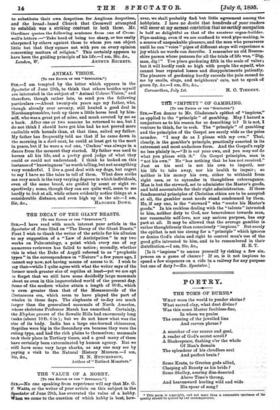THE "IMPIETY " OF GAMBLING.
[To THE EDITOR OF THE "SPECTATOR."] SIR,—Yon demur to Mr. Gladstone's epithet of "impious," as applied to the "principle " of gambling. May I hazard a conjecture as to his reason for so describing it P It is not, I venture to think, far to seek. The "principle" of gambling and the principles of the Gospel are surely wide as the poles asunder. "I may do as I please with my own." That, clearly, is the gambler's principle, practically asserted in its. extremest and most audacious form. And the Gospel's reply no less plainly is,—" It is not your own, and you may not de what you please with it." On Gospel principles, man is. "not his own." He "has nothing that he has not received.' Just as his soul is not his own to imperil, nor his life to take away, nor his health to impair ; so neither is his money his own, either to withhold from right uses, or to squander in thoughtless extravagance. Man is but the steward, set to administer the Master's goods, and held accountable for their right administration. If these fundamental principles of Christian ethics are to be accepted at all, the gambler must needs stand condemned by them. He, if any one, is the "steward" who "wastes his Master's, goods." In his reckless dealing with the " talents" intrusted to him, neither duty to God, nor benevolence towards man, nor reasonable self-love, nor any serious purpose, has any part at all. It may be allowed that the average gambler is. rather thoughtlessly than consciously "impious." But surely the epithet is not too strong for a " principle" which ignores, or denies God's claim and right to control man's use of the good gifts intrusted to him, and to be remembered in their
[Is it "impious" to amuse yourself by risking a few six.. pences on a game of chance ? If so, is it not impious to. spend a few sixpences on a ride in a railway for any purpose but one of duty P—En. Spectator.]








































 Previous page
Previous page